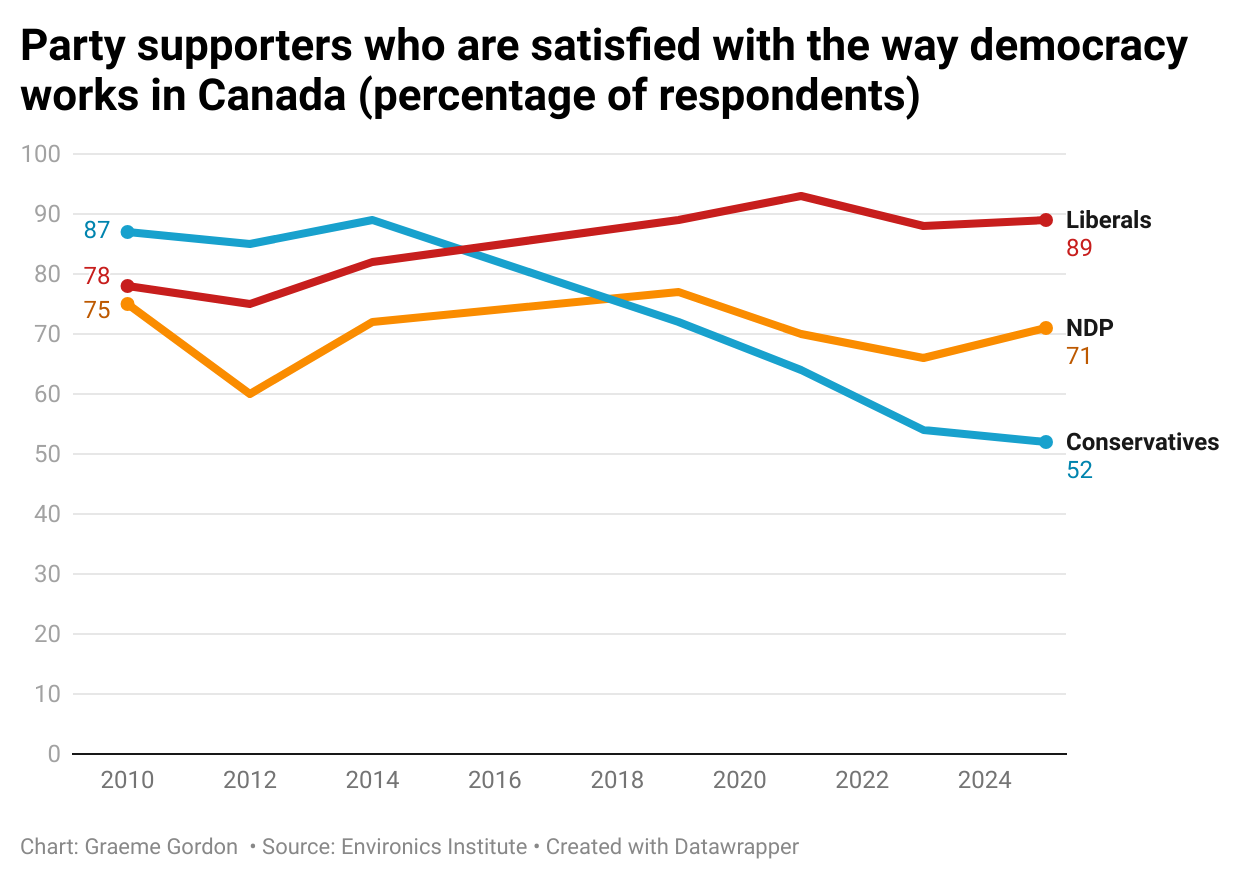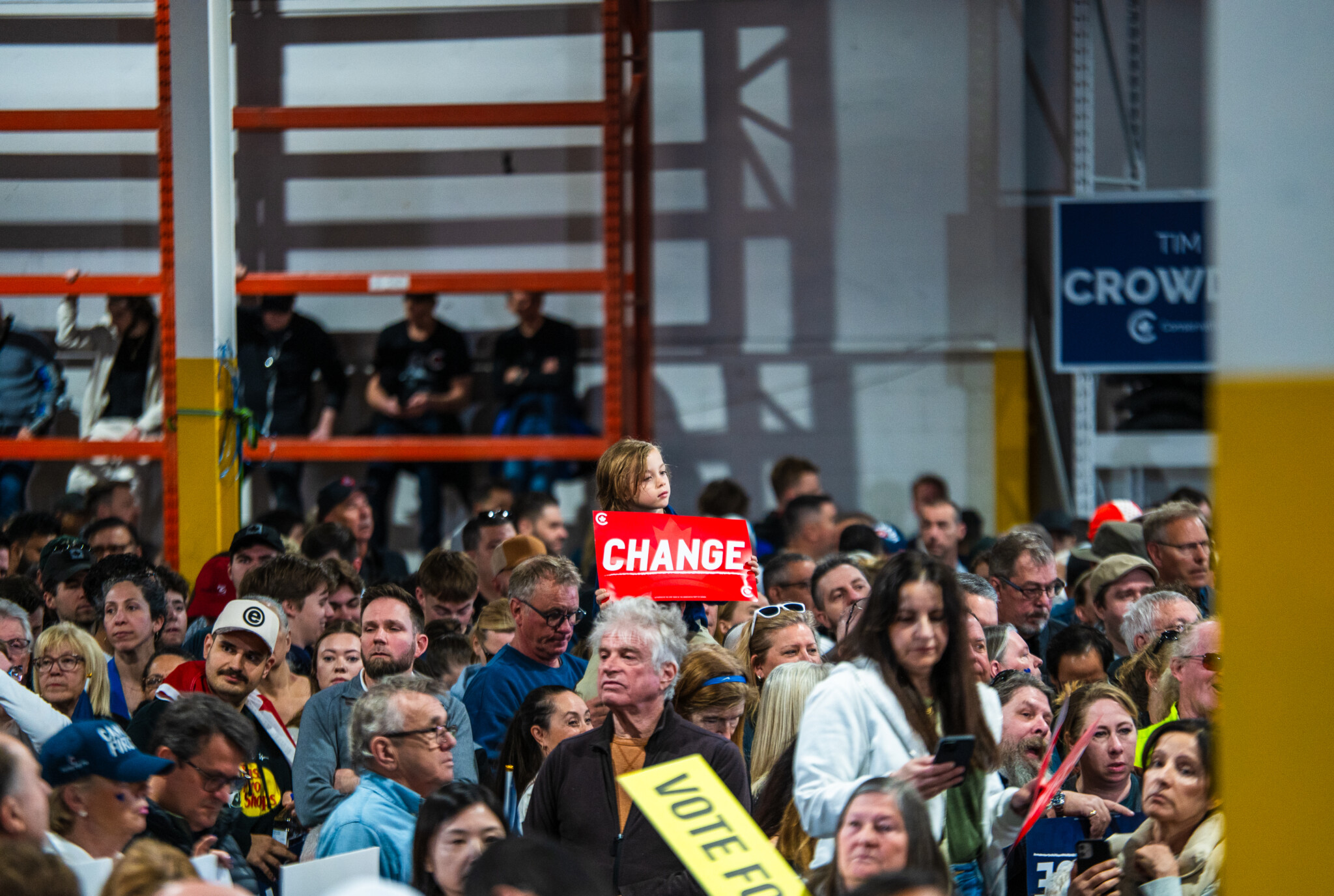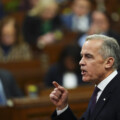Similar to sports fans, when their team is losing, the Canadian electorate starts blaming the refs. After their party’s fourth straight defeat last April, Conservative Party of Canada supporters are now split down the middle on whether or not they’re satisfied with Canada’s democracy, according to a new survey conducted by Environics. Out of all the Conservative supporters polled, a historic 48 percent responded that they were dissatisfied with Canadian democracy. This was compared to only 11 percent of the Liberals and 29 percent of the NDP respondents.
Back in 2014, during the tail end of then-prime minister Stephen Harper’s majority government, a super-majority of 89 percent of Conservative supporters were satisfied with the Canadian electoral system. In the past decade, however, it appears each consecutive loss to the Liberals further and further soured the appeal of Canada’s electoral system to Conservatives. By 2019, Tories satisfied with democracy dropped to 72 percent, then 64 percent in 2021, and 54 percent in 2023.
Meanwhile, federal Liberal and NDP approval of Canada’s democracy bottomed out near the end of the Harper years. Dippers’ satisfaction hit a low in 2012, when only 60 percent were happy. For the Liberal respondents, three-quarters said they were satisfied then.

Following the same trendline nationally, the survey found Albertans—in the bluest province—the least satisfied, with 62 percent of respondents hailing from the wild rose province saying they are happy with Canada’s democracy. After the Conservatives lost the last election, despite holding a major lead until Mark Carney replaced Justin Trudeau as Liberal leader and prime minister, an Angus Reid poll showed 36 percent of Albertans surveyed supported separatism.
On the other hand, in Quebec, where the Liberals won a majority of 44 seats and 22 Bloc Québécois MPs now hold the balance of power in a minority Parliament, 78 percent of respondents affirmed they were happy with Canada’s democracy. Quebecois sentiment mirrors their overall recent satisfaction level with being part of Canada, too. A Léger poll conducted last month showed only 35 percent of respondents from Quebec supported separatism.
Overall, 70 percent of Canadians were satisfied with how our democracy works, rising five percentage points from the previous 2023 Environics survey.
The 2025 survey also noted ways the Government of Canada could improve Canadians’ satisfaction and trust with federal elections.
“Steps should be taken to reinforce overall public confidence in the way votes are received and counted (including mail-in ballots), and in the way candidate selection and elections are insulated from foreign interference,” the survey’s findings read.
During the 2025 election, some voters reported mail-in ballots were not counted due to printing errors on the provided Elections Canada envelopes. In one case in a riding in north Montreal, a Bloc voter’s mail-in ballot was returned to sender due to an error on the envelope. The Liberal candidate won by one vote, and now the Bloc Québécois candidate is challenging the election result in court. Some respondents also questioned the validity of the vote counts, including 63 percent of Conservatives who said votes are counted fairly “sometimes” or “never.” Meanwhile, 29 percent of Liberals and 45 percent of NDP respondents said the same.
Canada’s recent foreign interference commission found that China and India were the two most prominent foreign actors interfering in Canada’s democratic processes, primarily through disinformation campaigns. The poll found 86 percent of respondents either agreed that foreign election interference happens or sometimes happens.
View reader comments (0)
Even though only 52 percent of Conservative respondents were satisfied with democracy, 78 percent still responded that they either had “high trust” or “some trust” in Canada’s democracy. Seventy-one percent agreed that “democracy is preferable to any other form of government.”
A surprisingly significant number of Canadian respondents believe that “under some circumstances an authoritarian government may be preferable”: 14 percent of Conservatives surveyed, 9 percent of NDPers, and 8 percent of Liberals.
Forty-one percent of Canadians surveyed showed high trust in Canada’s democracy, while 47 percent said they had “some trust,” while only 12 percent responded they had low trust in Canada’s federal elections. Out of the Conservative respondents, 22 percent had low trust for elections in Canada, compared to 2 percent of Liberals, 8 percent of NDP respondents. Low trust in elections actually bottomed out in 2014 during the Harper majority government, when 22 percent of respondents marked that they had low trust in Canadian elections.
The online survey was conducted with a sample of 3,550 Canadians aged 18 and older between July 30 and August 7. There was no margin of error.
Why might Conservative supporters be so dissatisfied with Canadian democracy after recent election losses?
How does regional sentiment on democracy in Canada differ, and what might explain these variations?
What specific concerns about election integrity are raised in the article, and how might they impact public trust?










Comments (0)